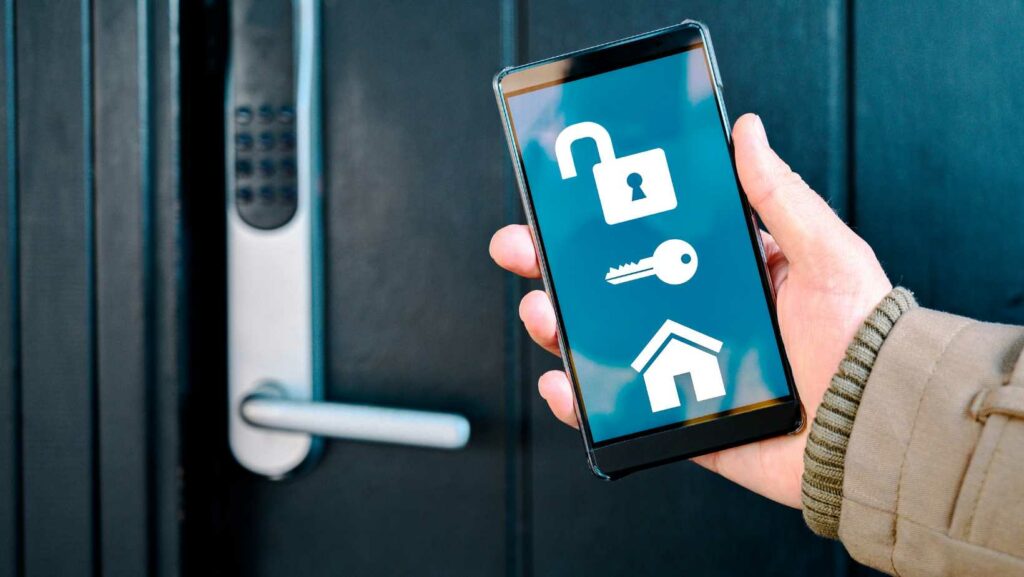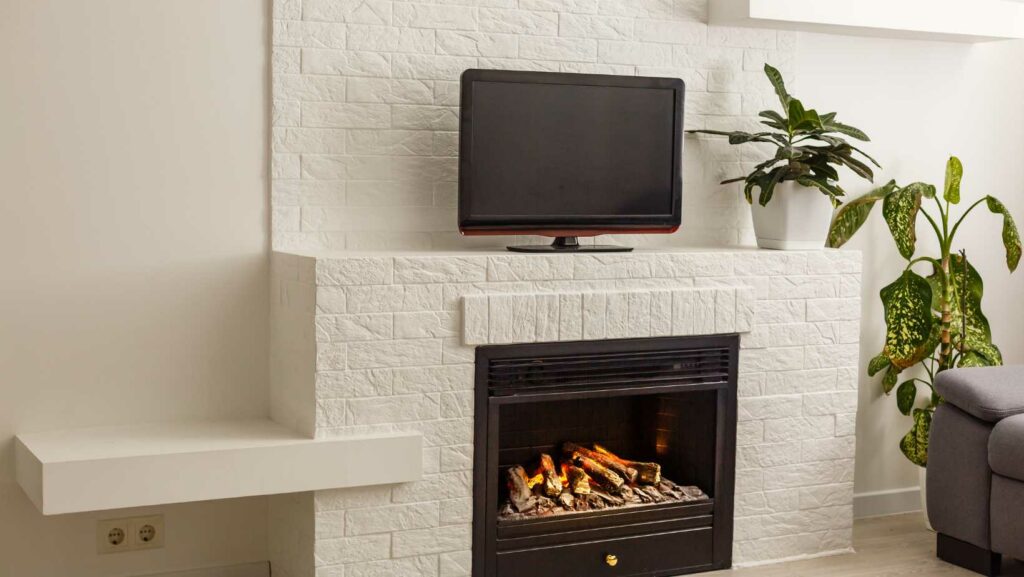Back tattoos stand as bold statements of personal expression that transform the body’s largest canvas into a mesmerizing work of art. From intricate tribal designs to sweeping landscapes these permanent masterpieces make heads turn and jaws drop wherever they’re revealed.
Getting inked on the back isn’t just about making a fashion statement – it’s about embracing a powerful form of self-expression that’s been practiced across cultures for thousands of years. Whether someone’s drawn to delicate butterfly wings between the shoulder blades or a full-back dragon that commands attention these tattoos offer endless possibilities for creativity and personal storytelling.
Espalda:Sudrk2rleyu= Tatuajes
Ancient civilizations practiced back tattooing as early as 3300 BCE, with Ötzi the Iceman displaying 61 tattoos across his back. Traditional Japanese culture popularized large-scale back tattoos called “irezumi” during the Edo period (1603-1867), featuring intricate designs of dragons, koi fish and cherry blossoms.
Polynesian cultures developed distinct back tattoo patterns that served as cultural identifiers, social status markers and personal achievements:
- Pe’a tattoos covered the back and lower body
- Malu designs represented feminine power
- Tatau patterns told family histories
Modern back tattoo symbolism varies across different designs:
| Design Type | Common Meaning | Popular Placement |
|---|---|---|
| Wings | Freedom, protection | Upper back |
| Dragons | Strength, wisdom | Full back |
| Mandalas | Balance, spirituality | Center back |
| Tribal | Heritage, power | Lower back |
Native American traditions incorporated back tattoos as spiritual protection symbols. Plains tribes used geometric patterns while woodland tribes favored nature-inspired designs. European sailors adopted back tattoos in the 1700s, marking their naval achievements through specific imagery:
- Crossed anchors indicated Atlantic crossings
- Swallows represented sailing experience
- Nautical stars guided sailors home
The contemporary renaissance of back espalda:sudrk2rleyu= tatuajes began in the 1970s with improved techniques and equipment. Artists like Ed Hardy transformed traditional designs into modern interpretations, establishing back pieces as prestigious custom artwork. Today’s back tattoos blend cultural heritage with personal significance, creating unique narratives through carefully chosen symbolism and placement.
Popular Back Tattoo Designs and Styles
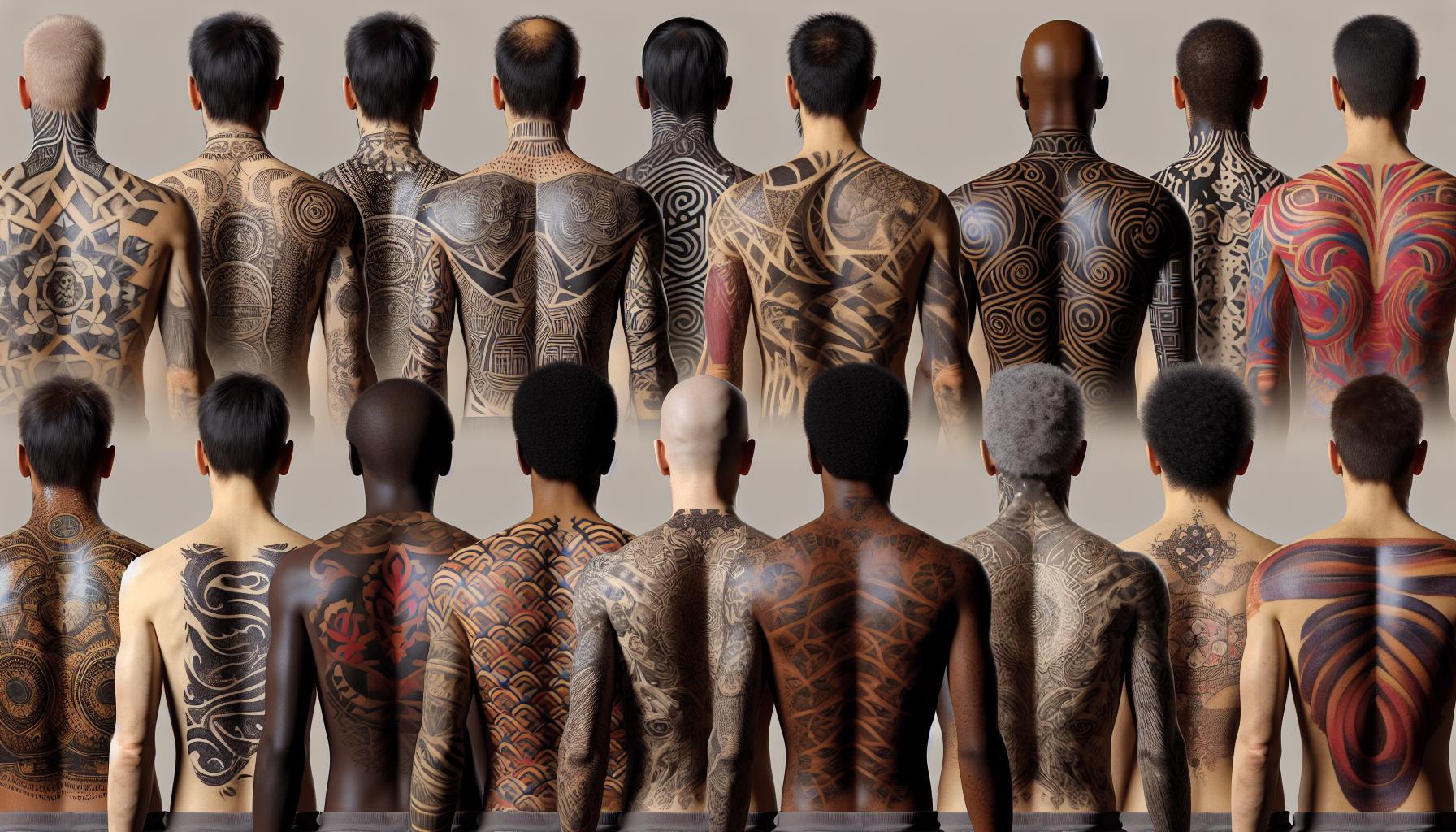
Back tattoos offer diverse artistic expressions through various designs ranging from minimalist pieces to elaborate compositions. Each style creates unique visual impact while accommodating different aesthetic preferences.
Full Back Pieces
Full back tattoos transform the entire espalda:sudrk2rleyu= tatuajes into an artistic canvas. Japanese-style pieces incorporate koi fish dragons clouds creating flowing compositions across the shoulder blades to lower back. Biomechanical designs feature intricate mechanical elements integrated with anatomical structures. Nature-themed landscapes span horizontally displaying mountains forests waterfalls in panoramic layouts. Celtic masterpieces integrate endless knots with spirals forming complex patterns that complement the back’s natural contours.
Tribal Patterns
Tribal tattoos draw inspiration from Polynesian Maori Hawaiian cultural traditions. Blackwork patterns incorporate bold geometric shapes curved lines angular elements. Samoan Pe’a designs feature symmetrical patterns extending from the lower back to the shoulders. Contemporary tribal variations blend traditional motifs with modern abstract elements. These designs emphasize strong clean lines creating striking visual contrast against the skin.
Symbolic Imagery
Symbolic tattoos convey personal meaning through specific imagery elements. Phoenix designs represent rebirth transformation spanning between shoulder blades. Angel wings extend from the spine outward symbolizing protection guidance freedom. Mandala patterns placed centrally create focal points representing spiritual harmony balance. Tree of life designs incorporate roots branches demonstrating growth connection to nature. Religious symbols Sanskrit texts occupy vertical spaces along the spine expressing faith spiritual journeys.
Considerations Before Getting a Back Tattoo
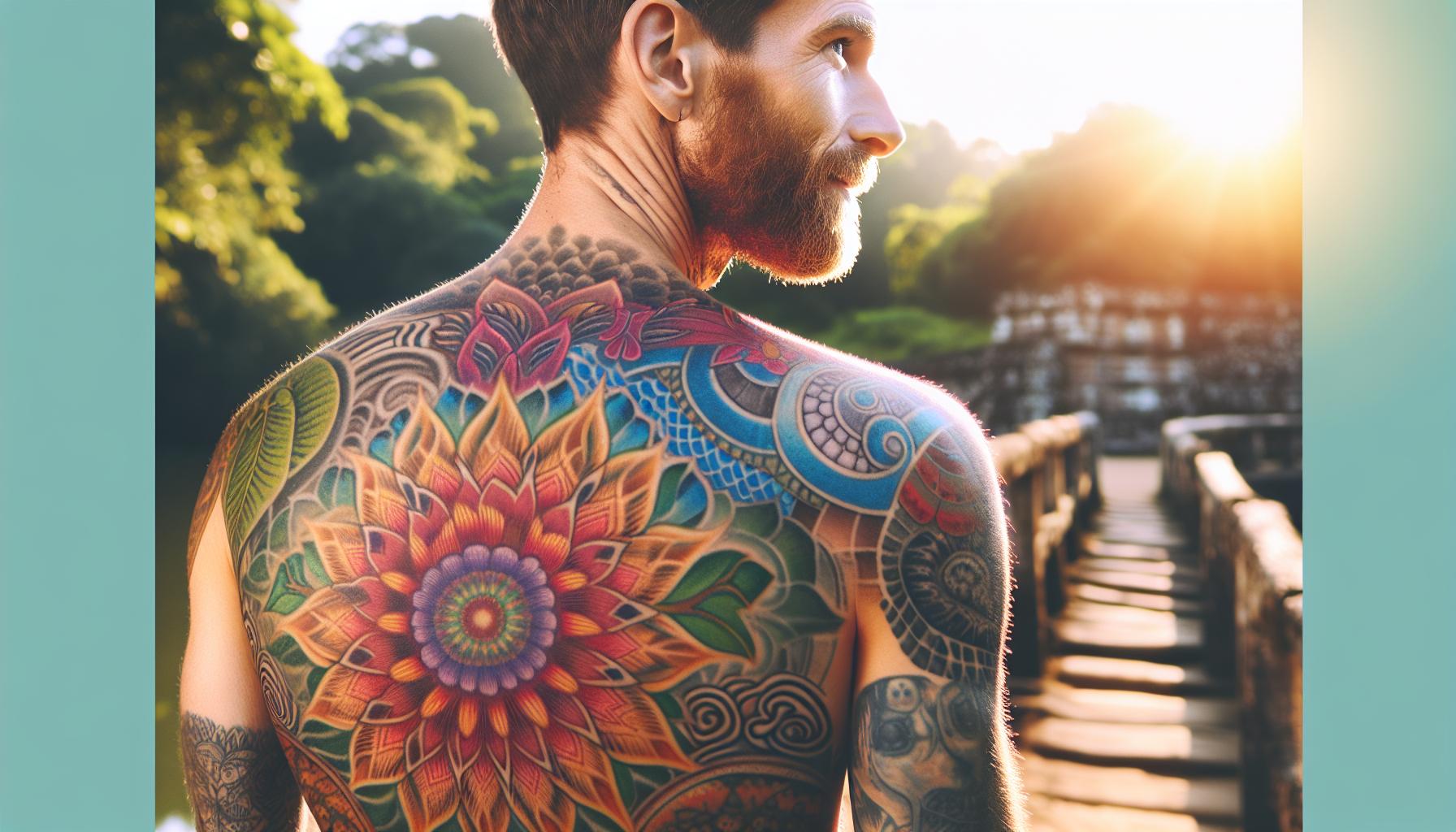
Back tattoos require careful planning due to their prominent placement and commitment level. The following aspects demand attention before proceeding with a back tattoo.
Pain Levels and Healing Time
Back tattoos create varying pain levels depending on the specific location. Areas near the spine produce intense sensations due to numerous nerve endings while the lower back generates moderate discomfort. Upper shoulder regions cause minimal pain compared to other back areas. The healing process spans 2-3 weeks for initial recovery with complete healing occurring within 2 months. Scabbing appears during days 3-7 followed by peeling between days 7-14. Factors affecting healing include:
- Sleep position modifications for 2 weeks
- Limited exercise for 14 days
- Daily cleaning routine 3-4 times
- Protection from sun exposure for 4 weeks
- Moisturizing schedule every 4-6 hours
Size and Placement Options
Back tattoo dimensions range from small 2-inch designs to full-back pieces measuring 15×20 inches. The upper back accommodates symmetrical designs centered between shoulder blades. Lower back placements work effectively for horizontal pieces spanning 6-8 inches. Common placement choices include:
- Center spine vertical designs (10-14 inches)
- Shoulder blade focal points (4-6 inches)
- Side rib extensions (8-12 inches)
- Lower back horizontal bands (6-8 inches)
- Full back coverage (15×20 inches)
Each placement offers distinct canvas spaces for artistic expression based on anatomical contours.
The Tattoo Process and Aftercare
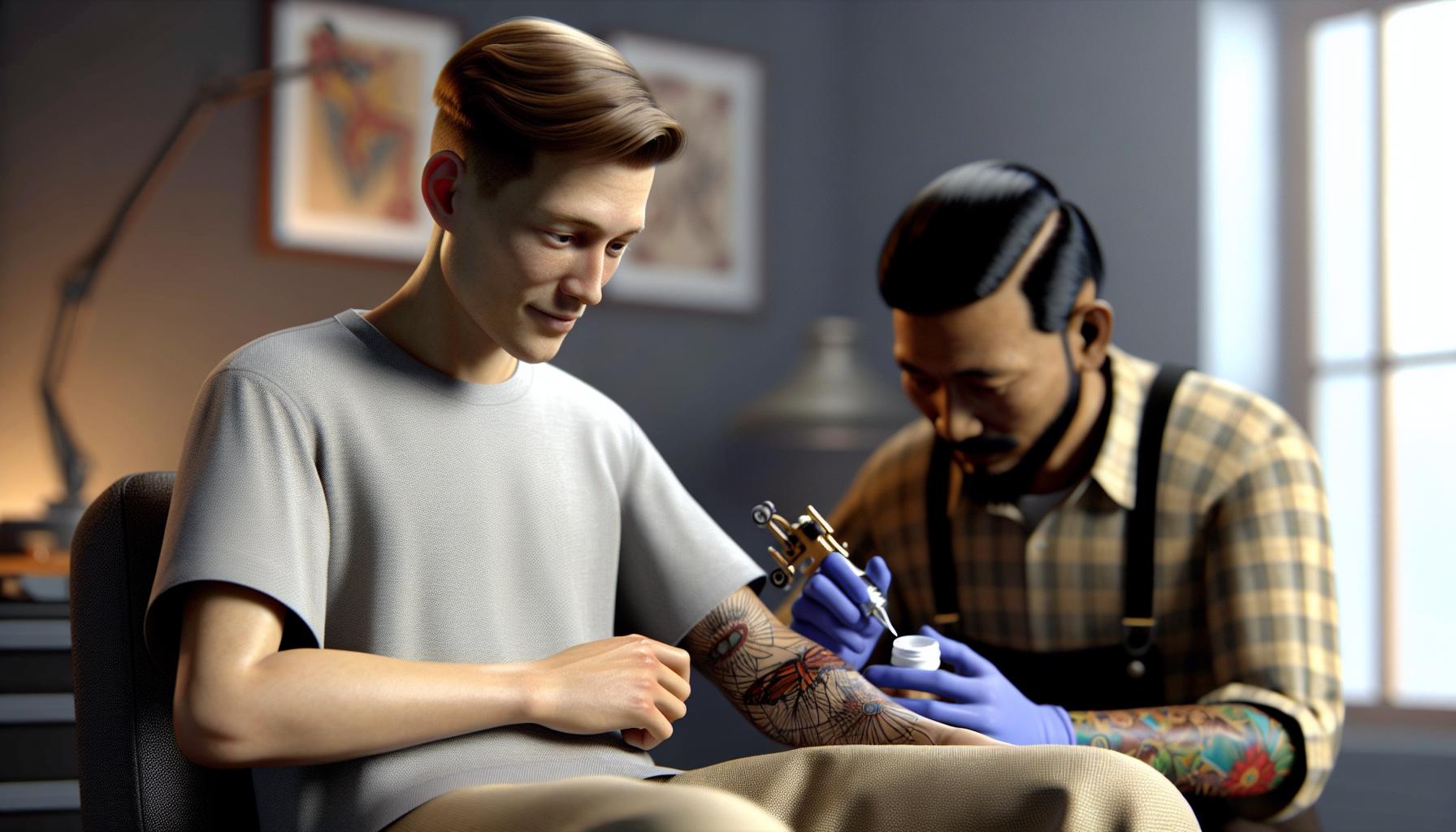
Back tattoos require specific preparation and maintenance protocols to ensure optimal healing and longevity. The process involves multiple steps from initial preparation through complete healing.
Preparing for Your Session
Proper preparation starts 48 hours before the appointment with thorough skin cleansing and moisturizing. Clients arrive with clean, moisturized skin free from sunburn, cuts or skin conditions. A light meal 2 hours before the session maintains blood sugar levels throughout the procedure. Wearing loose, comfortable clothing provides easy access to the back area. Essential items to bring include:
- Approved skin moisturizer for post-session care
- Button-up shirt or zip-up jacket for leaving the studio
- Small snacks to maintain energy levels
- Entertainment options like headphones or tablets
- Required identification and payment methods
Recovery and Maintenance
The healing journey spans 4-6 weeks with distinct phases requiring specific care protocols. Days 1-3 focus on keeping the area clean with antibacterial soap and applying prescribed ointment 3 times daily. Physical activities to avoid during healing include:
- Swimming or soaking in water for 14 days
- Direct sun exposure for 30 days
- Heavy exercise for 7 days
- Sleeping on the tattooed area for 14 days
- Mild redness lasting 2-3 days
- Light scabbing after 5-7 days
- Skin flaking between days 7-14
- Complete skin healing at 4 weeks
Finding the Right Tattoo Artist
A qualified back tattoo artist possesses at least 5 years of experience creating large-scale pieces. Professional portfolios showcase extensive back tattoo work, including healed results from previous clients.
Key qualifications to verify include:
- State certification in bloodborne pathogens
- Current health department licensing
- Professional memberships in tattoo artist associations
- Specialized training in custom design work
- Portfolio focused on back pieces
Experienced artists demonstrate these technical skills:
- Clean line work in curved areas
- Balanced composition across the back canvas
- Proper depth control for lasting results
- Color saturation techniques
- Custom design adaptation to body contours
Studio evaluation criteria includes:
- Sterile workspace with medical-grade equipment
- Single-use needles opened at appointment
- Autoclave sterilization protocols
- Professional lighting systems
- Private tattooing areas
The consultation process involves:
- Reviewing artist portfolios
- Discussing design concepts
- Evaluating skin condition
- Planning placement details
- Scheduling timeline expectations
- Unlicensed home studios
- Discounted pricing below market rates
- Limited portfolio examples
- Reluctance to show healed work
- Poor hygiene practices
| Artist Experience Level | Typical Cost Range (USD) | Average Session Length |
|---|---|---|
| 5-10 years | $150-250 per hour | 3-5 hours |
| 10+ years | $200-350 per hour | 4-6 hours |
| Master Level | $300-500+ per hour | 5-8 hours |
Back Tattoos
Back tattoos represent a powerful fusion of artistry cultural heritage and personal expression. They’ve evolved from ancient traditions into contemporary masterpieces that tell unique stories through intricate designs. Whether choosing a small symbolic piece or committing to a full-back masterpiece the journey requires careful consideration proper planning and dedication to aftercare.
The right artist expertise and understanding of the healing process ensure that these permanent pieces of art maintain their beauty for years to come. Back tattoos aren’t just trendy body modifications – they’re meaningful investments in self-expression that transform the body’s largest canvas into a personal gallery of artistry and symbolism.

